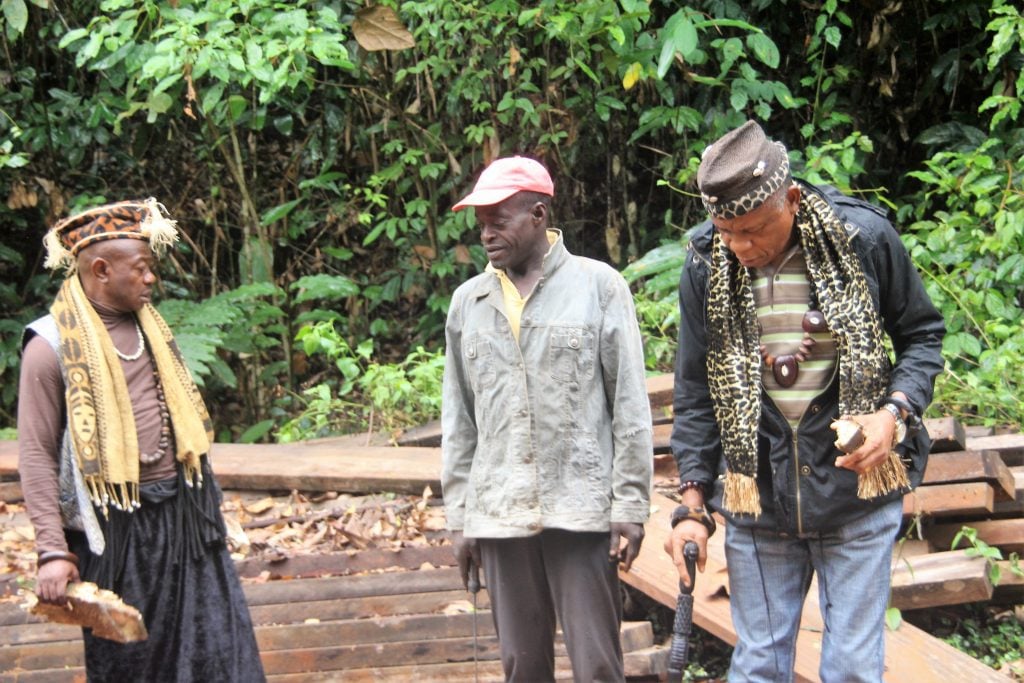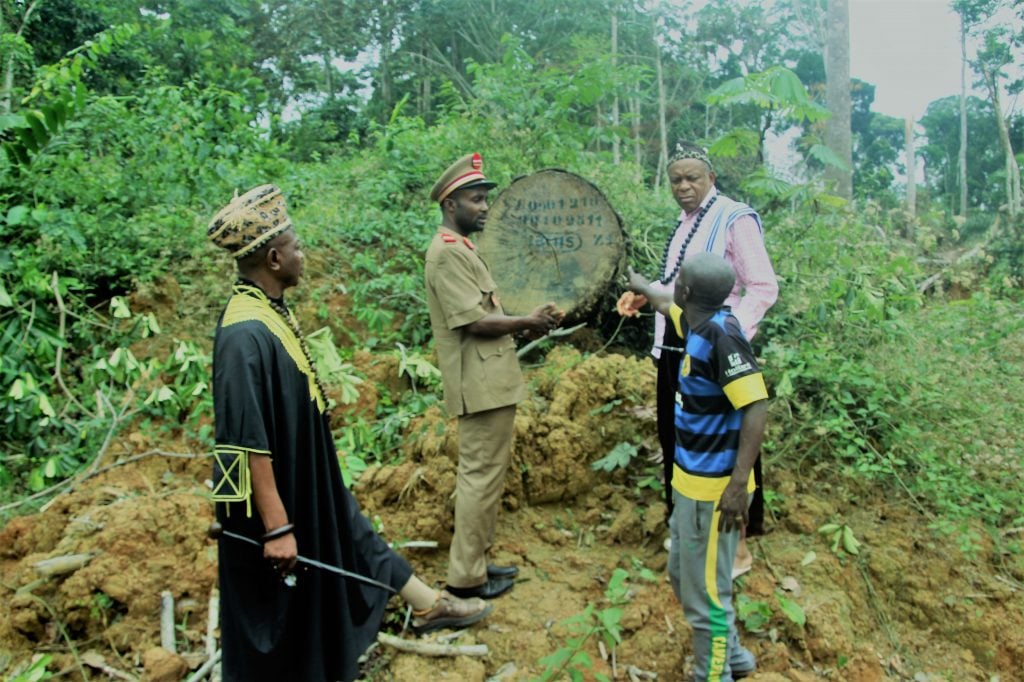Stepping into the forest in Djoameodjoh, a small locality in Lomie in the Upper Nyong division of the East region Cameroon, the chatter and hooting from the people and motorbikes in neighboring villages gives way to silence.
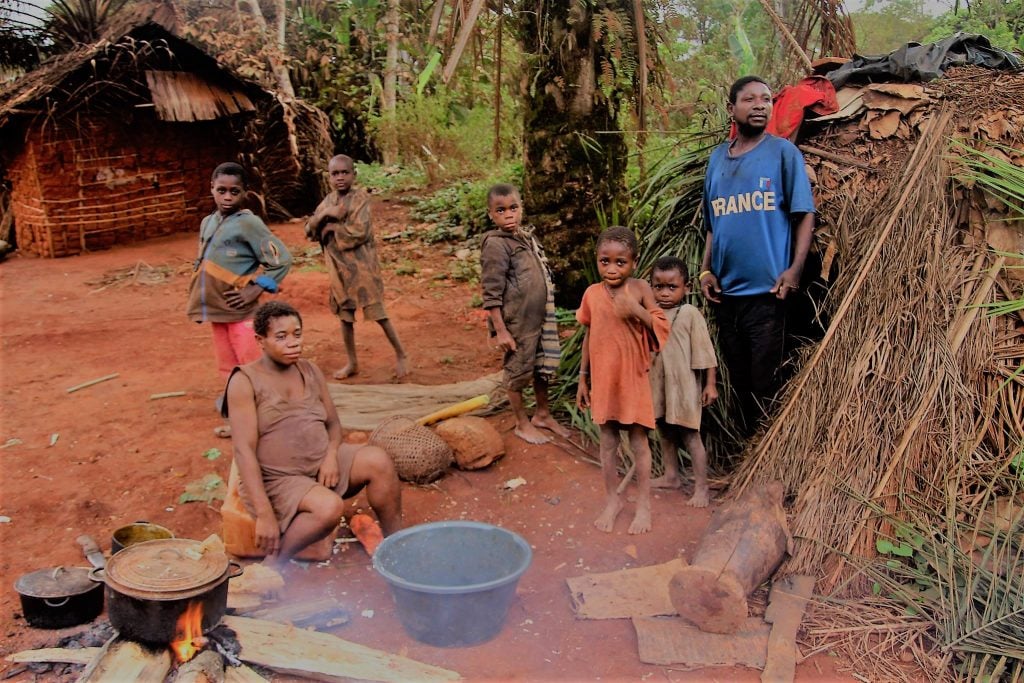
Baka families continue to live in abject poverty though surrounded by forest wealth Photo credit/Eugene Ndi
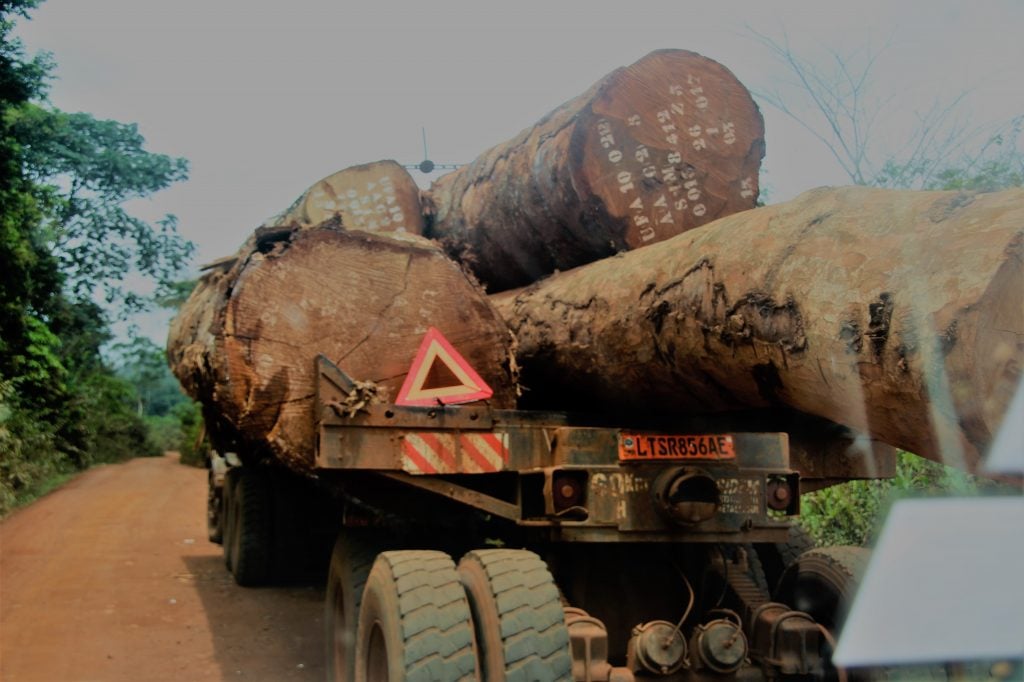
Truck transporting logs in Djoum. Forest communities are demanding clarity in the management of financial fallouts and the creation of an independent body that will ensure transparency and improve governance in a complex and troubled sector Photo credit/Eugene Ndi
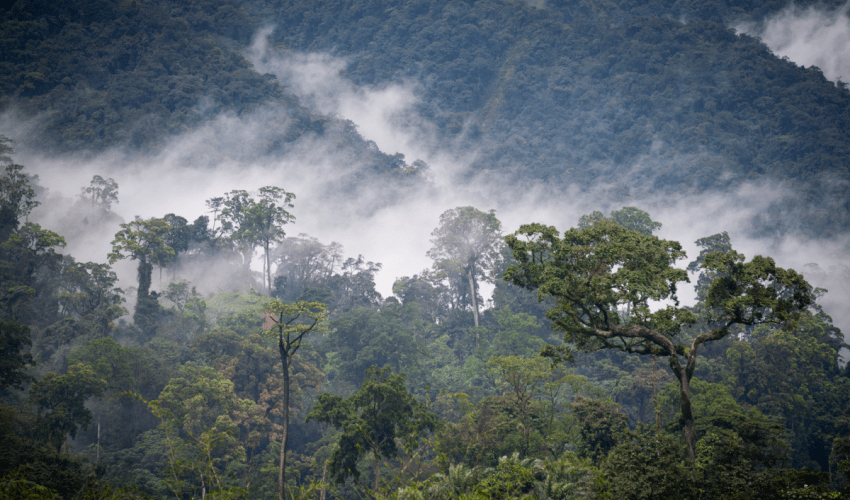
The forest in this community is a biodiversity hotspot that should be contributing significantly to the socio-economic development of the people.
A guide and community forest monitor, Arnold Zenge slashes through the thick canopy, slowly making his way along a trail of grass and bush marked with tracks of cutting grass and porcupine. College Jerseys One could hear shrieks from far distances. “Those are probably the sounds of animals,” Arnold says, evoking reminiscences of the past when the community made their living from their forest habitat. “Human encroachment has scared many animals to far distances, making it perilous for us to find some for food during our hunting expeditions.” The forest in this community is a biodiversity hotspot that should be contributing significantly to the socio-economic development of the people. Washington Huskies “But this is now far from the reality,” Arnold says shaking his head in resignation. Just like Djoameodjoh in the East, Cameroon’s rich equatorial forest that straddles the South and Centre regions is increasingly the new found ground for agro-investors and timber exploitation companies. Environment experts say it is an attraction to timber and mineral exploitation companies from China, Indonesia, Britain, and France. AIR PEGASUS 92-16 “We have observed a surge in forest resource exploitation activities with the increased presence of Chinese and other foreign business operators in Cameroon,” said Bernard Njonga, coordinator of Cameroon-based NGO Support Service for Local Development Initiatives (SAILD). “Even the different national investment projects geared towards economic emergence drive are located in the forest regions of the East and South,” says Njonga. But the local communities that depend on the forest for their livelihood say there is trouble with increasing forest oversight and violation of their rights by encroachers. “Forest that used to serve as an important safety net for the poor rural community in times of economic or agricultural stress is no longer under our control. Those coming to exploit our resources don’t respect their promises,” says Paul Gbalene, Traditional Chief of Djoameodjoh. “Logging companies are saying one thing today and doing the other tomorrow, and our government is not applying the laws to sanction these persistent violations,” he added. Forest communities in Djoum in the South, Lomie in the East, and Lembe Yezoum in the Center region have all bemoaned the persistent nonrespect of promises made by investors that invade and exploit their land and resources depriving them of their rights to take full advantage of the fallouts of resource exploitation in their respective communities. They are thus seeking clarity in the management of financial fallouts and the creation of an independent body that will ensure transparency and improve governance in a complex and troubled sector. Cal Bears “The government does not respect its laws, and many forest malpractices go unpunished. We need negotiations that are transparent with a clear protection of the interest of forest communities,” says Mbondjo Remy traditional ruler and head of Avebe community, in Dja et Lobo in the South. The communities want the network of traditional rulers engaged in the protection of the environment and sustainable management of forest ecosystems in Africa known by its French acronym as RECTRAD to hence be part of all negotiations between forest communities and investors.
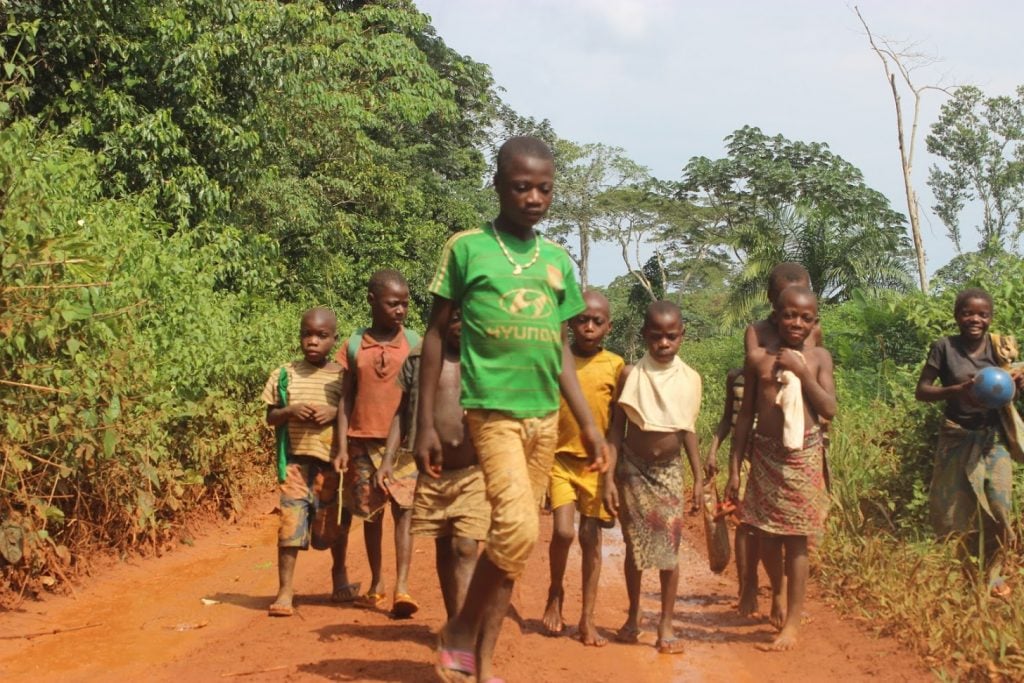
Logging activities, it is argued sometimes result in improvement of standard of living of communities, but in many cases in the Congo Basin, it ends up undermining the livelihoods of local and indigenous communities
“The forest community through their traditional rulers have to be part of the entire bargaining process in any dealings between the government and investors,” Mbonjo says. They have disillusioned that their lack of representation in the different phases of project negotiations makes them vulnerable to cheating by often misleading investors. Air Jordan 1 In Djoameodjoh, a small forest locality in Lomie in the Upper Nyong division of the East Region, the population say they are still expecting to see the better living conditions promised by Chinese logging company, Société Forestière du Haut-Nyong (SOFOHNY). The logging company, according to the village head, obtained a “sales of standing volume” known in French as Ventes de Coupe (VC) in April 2013 to exploit 54495 cubic meters of wood on a surface area of 2500 hectares of the Djoameodjoh community forest. Among other clauses in the arrangement, the company was supposed to pay the community directly, the sum of FCFA 1,500 per cubic meter of wood exploited from the concession, the village chief, Paul Gbalene explained. Unfortunately for the local community made of Bantus and Bakas (pygmies), the logging company did not fully respect its own side of the bargain. “The money we were promised to permit us to carry out own priority projects like water, schools or health centers has not been totally provided just like promises to open and maintain enclave local community roads,” he said.
The community is disturbed that SOFOHNY harvested wood and abandoned logs in the forest, depriving them of the benefits from the already cut but not evacuated wood. Air Jordan 13 SOFOHNY they say have abandoned a lot of logs in the forest which is a great loss to the Community. Ohio State Buckeyes However, the exploitation company and administrative officials in some of the localities have debunked the accusation, saying it is a matter of misunderstanding. A senior official of SOFHONY who gave his name as Cheriff justified that the company’s permit had expired and could not continue activities in the Djoum Forest area. “We could not go back into the forest to collect the logs because we are still waiting for renewal of our permit,” he said. He said though the company employs Chinese nationals with the technical know-how it is a domestic logging firm. Ronnie Harrison Jersey “Murky Money” Forest communities complain they have little idea about the exact amount of money their villages are due by the right to help them cope with development challenges, because of murky accounting methods and a lack of transparency by government agents and the exploitation companies. Uncertainty from one year to the next makes it impossible for vulnerable communities to take the action they need to protect their citizens, say traditional authorities and environment experts. “Forest communities have to be properly sensitized on their rights to avoid unnecessary conflicts,” says His Majesty Mfaw Robinson Tanyi, traditional ruler of Tinto in the South West region and also President of the Federation of Community Forests in Cameroon (FEDEFCOM) This prevailing murkiness only heightens distrust around the negotiating table and breeds conflict with persistent protest sometimes pitting forest communities and the government administrative authorities or the forces of law and order, he says. Different locality, same complaints In Djoum in Dja and Lobo in the South region, the village of Avebe say they are suffering the same fate with the non-respect of promises by SIBOIS, a logging company. In Lembe Yezoum in the Upper Sanaga division of the Centre region, the forest community of Endoum has similar complaints against CTA logging company. The indigenous forest community of Djoum say SIBOIS has failed to respect terms of a verbal agreement reached by both parties in January 2016. After securing the logging permit, the firm reached an agreement with the community to be paying FCFA 1000 per cubic meter of wood exploited from the community forest, the traditional ruler and head of Avebe community, Mbondjo Remy explained. “Since the company paid the initial FCFA 900,000 we have not heard from them again,” Chief Mbondjo said. “After about a month of exploitation, the company left without paying the community’s money and also abandoning logs in the forest,” he said. They also accuse the company of extending its activities outside its legal logging title; VC 0901210. The Divisional Officer of Lomie, Oumarou Housseini admitted the money to be paid to the community has been delayed and kept in the public treasury for security reasons. “When the company brought the money in 2013, it was in the midst of the municipal and legislative elections, and the mayor’s signature was invalid,” the D.O explained saying it was in safety. Development actors have continued to emphasize the need to engage forest people in sustainable forest management to reap long-term benefits. According to the World Bank Forest Action Plan, the impact of forests on poverty is greatest in Africa, with forest-related income lifting 11% of rural households out of extreme poverty.
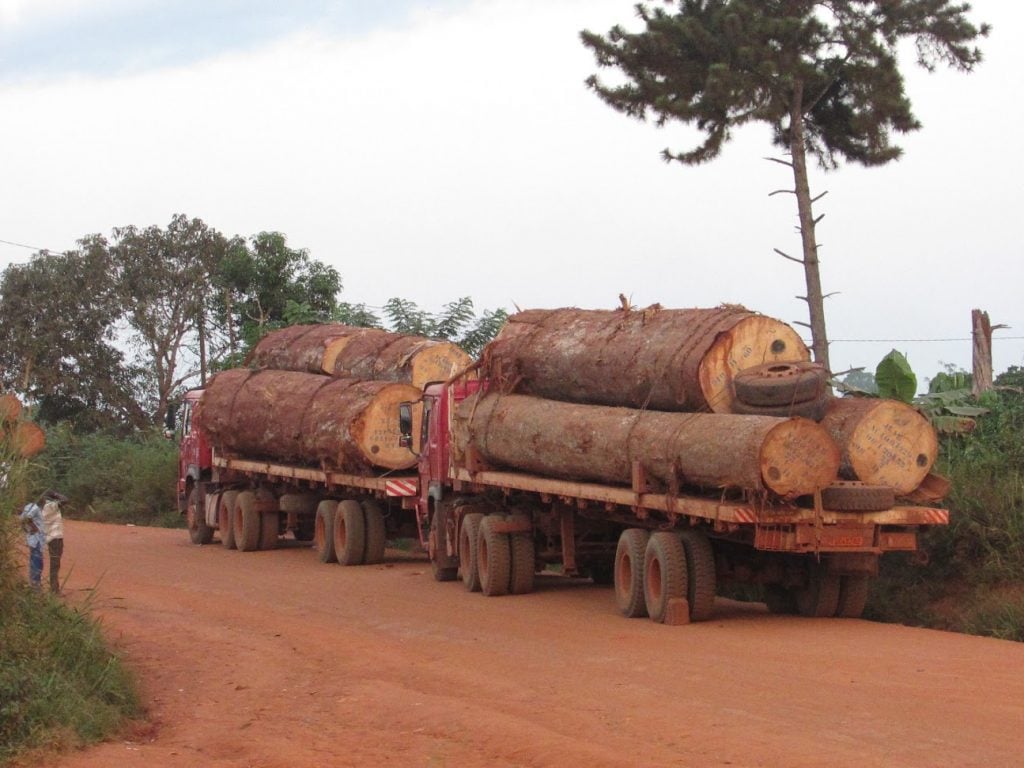
Elected officials have long criticized activities of logging companies saying their primary concern is not the sustainable development of communities.
Forests also supply critical raw materials needed to grow the economy, provide habitat to rich flora and fauna, regulate hydrology, and sequester carbon.

